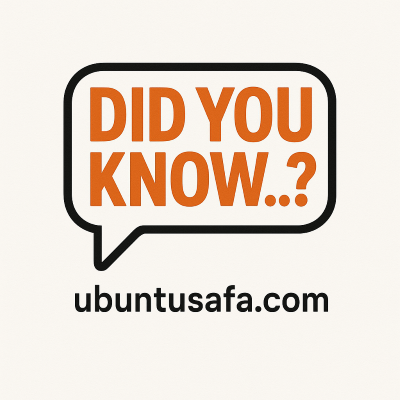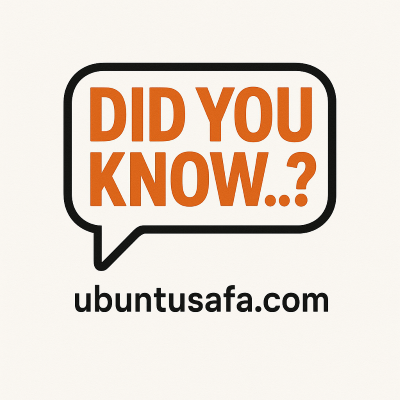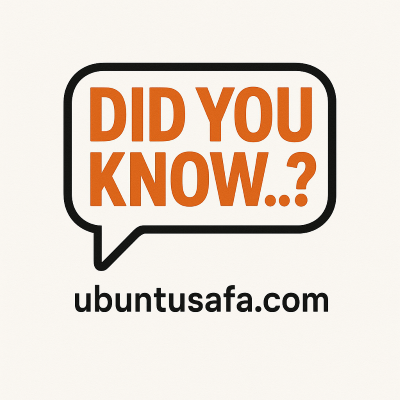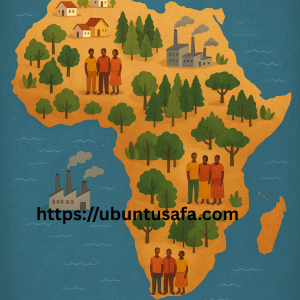Looking for the best education CRM development company? We build custom CRM solutions tailored for schools, colleges, coaching centers, and universities.
for more: https://duplextech.com/blo...
What role should traditional medicine play in Nigeria's health system?
Traditional medicine (TM), often referred to as "African Traditional Medicine" (ATM) or "Alternative Medicine" (though the latter term can be broader), plays an incredibly significant, and often indispensable, role in Nigeria's health system, particularly given the challenges facing conventional Western medicine.
Over 70-80% of Nigerians, especially those in rural and low-income communities, rely on traditional medicine for their primary healthcare needs.
The role of traditional medicine should ideally be one of integration, regulation, and research, leveraging its strengths while mitigating its risks, to complement and enhance the formal healthcare system.
Here's a breakdown of its current and potential roles:
I. Current De Facto Role (Filling the Gaps):
Primary Healthcare Provider for the Underserved: In many rural areas where modern healthcare facilities are scarce or non-existent, traditional healers are often the only accessible and affordable source of healthcare. They serve as the first point of contact for a vast majority of the population.
Affordability and Accessibility: Traditional remedies and consultations are often cheaper than orthodox medicine, and payment in kind (e.g., farm produce) can be acceptable. Traditional practitioners are typically located within communities, making them highly accessible.
Cultural and Spiritual Resonance: Traditional medicine often takes a holistic approach, addressing not just physical ailments but also spiritual, psychological, and social dimensions of health. This resonates deeply with the cultural beliefs and worldview of many Nigerians regarding disease causation and healing.
Treatment of Specific Ailments: Traditional medicine has long been relied upon for managing certain conditions, such as:
Bone setting: Traditional bone setters (TBS) are popular for treating fractures and dislocations.
Mental health: Traditional healers often deal with mental illnesses, which are frequently attributed to spiritual causes in many Nigerian cultures.
Obstetrics and Gynecology: Traditional birth attendants (TBAs) play a significant role in maternal care, particularly in rural settings.
Herbal Remedies: A vast array of medicinal plants are used to treat common ailments like malaria, fever, skin infections, and digestive issues.
Source of New Drug Discovery: Many modern pharmaceutical drugs have their origins in traditional plant-based remedies (e.g., quinine from cinchona bark for malaria, artemisinin from Artemisia annua).
II. The Ideal and Future Role (Integration, Regulation, and Research):
Integration into Primary Healthcare:
Referral System: Traditional practitioners can be trained to recognize conditions beyond their scope and refer patients to modern health facilities. Conversely, orthodox doctors should be educated about common traditional practices to facilitate communication and understanding with patients.
Collaborative Care: For certain conditions, a collaborative approach could be beneficial, where traditional and modern practitioners work together, especially in areas like mental health, rehabilitation, and chronic disease management.
Community Health Workers: Traditional healers, with their deep community trust, could be integrated into community health worker networks for health promotion, disease prevention, and surveillance.
Standardization and Regulation:
National Policy and Legal Framework: Develop clear national policies and legal frameworks for the practice of traditional medicine, defining roles, responsibilities, and standards.
Registration and Licensing: Establish a robust system for the registration, licensing, and certification of traditional medicine practitioners (TMPs) to ensure they meet minimum standards of training and ethics.
Quality Control of Herbal Products: Implement strict regulations for the cultivation, harvesting, processing, packaging, labeling, and marketing of herbal remedies. NAFDAC (National Agency for Food and Drug Administration and Control) has a role here in ensuring safety, quality, and efficacy.
Code of Ethics: Develop and enforce a code of conduct and ethics for TMPs to curb quackery, exploitation, and harmful practices.
Scientific Research and Validation:
Efficacy and Safety Studies: Conduct rigorous scientific research, clinical trials, and toxicological studies on widely used traditional remedies to ascertain their efficacy, safety, active compounds, dosages, and potential side effects or drug interactions.
Preservation of Knowledge: Document and archive traditional medicinal knowledge (which is often oral and localized) to prevent its loss and facilitate scientific study. This also raises issues of intellectual property rights for traditional knowledge holders.
Drug Discovery: Invest in pharmaceutical research and development to identify new drug candidates from Nigeria's rich biodiversity, collaborating with traditional healers.
Education and Training:
Formal Training for TMPs: Develop formal training programs for TMPs that combine traditional knowledge with basic modern medical concepts (e.g., anatomy, physiology, hygiene, first aid, record-keeping, referral protocols).
Cross-Cultural Education: Incorporate elements of traditional medicine into the curriculum of modern medical and nursing schools to foster understanding, respect, and potential collaboration.
Public Education: Educate the public on the importance of seeking validated and regulated traditional medicines, and the dangers of harmful practices or unproven remedies.
III. Challenges to Integration:
Lack of Standardization: The diverse, often secretive, and undocumented nature of TM practices.
Safety and Efficacy Concerns: Issues with dosage, purity, potential toxicity, and lack of scientific evidence for many traditional remedies.
Quackery: The prevalence of charlatans and untrained individuals who exploit public trust.
Professional Skepticism: Resistance and distrust from some orthodox medical practitioners towards TM.
Spiritual vs. Scientific Divide: The challenge of reconciling spiritual and cultural aspects of TM with the scientific, evidence-based approach of modern medicine.
Despite these challenges, ignoring traditional medicine in Nigeria is not an option. Its widespread use and cultural significance necessitate its proper integration into the national healthcare system, ensuring safety, efficacy, and ultimately, better health outcomes for all Nigerians.
How can public hospitals be improved to serve the poor better?
Improving public hospitals to better serve the poor requires a comprehensive strategy that addresses the core issues of funding, infrastructure, human resources, efficiency, and patient-centered care.
For a country like Nigeria, where the majority of the population relies on public healthcare and poverty is widespread, these improvements are vital for national development and social equity.
Here's a detailed approach:
I. Increased and Transparent Funding:
Allocate More Budgetary Resources: Governments at federal, state, and local levels must significantly increase the percentage of their budgets allocated to healthcare, aiming to meet or exceed international recommendations (e.g., the Abuja Declaration's 15%).
Targeted Funding for the Poor: Earmark specific funds for initiatives that directly benefit low-income patients, such as subsidized or free essential services, medications, and diagnostic tests for those who cannot afford them.
Strengthen Health Insurance Schemes (e.g., NHIS):
Expand Coverage: Aggressively expand the reach of the National Health Insurance Scheme (NHIS) to cover a larger portion of the informal sector and vulnerable populations, potentially through community-based health insurance models or state-led initiatives.
Subsidies for the Poor: Implement government subsidies or premium support for low-income households to ensure they can afford health insurance contributions.
Streamline Processes: Simplify the enrollment and claims processes for the poor to reduce bureaucratic hurdles.
Combat Corruption and Ensure Accountability:
Implement robust financial management systems, regular audits, and strict anti-corruption measures within public hospitals to prevent embezzlement and ensure funds are used for their intended purpose.
Introduce performance-based funding where hospitals receive additional funds based on patient outcomes, efficiency, and satisfaction.
II. Infrastructure and Equipment Upgrade:
Renovation and Modernization: Invest in systematic renovation and modernization of existing public hospital buildings to create clean, safe, and dignified environments.
Equip with Modern Technology: Provide essential, functional diagnostic and treatment equipment (e.g., X-ray machines, ultrasound scanners, laboratory equipment, essential surgical tools). Ensure maintenance contracts and availability of spare parts.
Reliable Utilities: Guarantee constant access to clean water, reliable electricity (invest in solar power as a sustainable backup), and proper waste management systems in all public hospitals.
Basic Amenities: Ensure availability of basic amenities like clean restrooms (separate for male/female), comfortable waiting areas, and proper ventilation.
III. Human Resources Development and Motivation:
Adequate Staffing: Recruit and retain a sufficient number of qualified doctors, nurses, pharmacists, laboratory scientists, and other support staff to reduce workload and improve patient-to-staff ratios.
Competitive Remuneration and Welfare: Offer attractive and timely salaries, allowances, and a comprehensive benefits package (including health insurance and pensions) to stem the brain drain and motivate staff.
Continuous Professional Development (CPD): Provide regular training opportunities to upgrade skills, keep staff abreast of new medical advancements, and improve patient communication.
Ethical Conduct and Empathy Training: Conduct mandatory training on medical ethics, patient rights, empathy, and respectful communication, particularly towards low-income patients who may feel disempowered.
Performance Incentives: Introduce performance-based incentives for staff tied to patient satisfaction, quality of care, and efficiency, rather than just volume.
Safety and Security: Enhance security measures within hospital premises to protect staff from harassment or violence.
IV. Operational Efficiency and Patient-Centered Care:
Streamline Processes: Implement efficient patient flow systems, from registration to consultation, diagnosis, and treatment, to reduce long waiting times and bureaucratic bottlenecks.
Digitalization (Electronic Health Records - EHR):
Implement EHR systems to improve record-keeping, reduce errors, enhance data sharing among departments, and enable better patient tracking.
Digitalize appointment scheduling and billing to minimize human interface and reduce opportunities for corruption.
Focus on Primary Healthcare (PHC): Strengthen the referral system from PHC centers to secondary and tertiary public hospitals. Well-equipped and staffed PHCs can manage common ailments, reducing the burden on hospitals and making basic care accessible at the community level.
Culturally Sensitive Care: Train staff to understand and respect the cultural beliefs and practices of diverse patient populations, which can influence health-seeking behaviors.
Patient Feedback Mechanisms: Establish accessible and confidential channels for patients to provide feedback, lodge complaints, and make suggestions for improvement. Use this feedback to drive continuous improvement.
Transparency and Information: Clearly display service costs (if any), patients' rights, and grievance procedures. Provide clear information about treatment plans in a language patients understand.
V. Innovative Service Delivery Models:
Mobile Clinics and Outreach Programs: Implement mobile health clinics that travel to underserved rural communities, providing basic diagnostic, preventive, and primary care services, as well as health education.
Telemedicine: Leverage telemedicine for remote consultations, specialist opinions, and follow-ups, particularly for patients in remote areas where specialists are scarce. This can reduce travel costs and time for patients.
Community Health Workers (CHWs): Train and deploy CHWs from within the communities to act as a link between the community and the health system, providing basic health education, screening, and facilitating referrals.
Partnerships with NGOs and CSOs: Collaborate with non-governmental organizations and civil society organizations that have experience in delivering healthcare to underserved populations.
By implementing these strategies, public hospitals can move towards becoming trusted, accessible, and high-quality healthcare providers for all, especially the most vulnerable members of society.
How does economic dependency translate into political or cultural influence from foreign powers?
Economic dependency translates into political or cultural influence from foreign powers through a process often referred to as soft power.
This influence is non-coercive and stems from the ability to attract and persuade rather than to threaten or force. When a country becomes heavily reliant on another for trade, investment, or aid, it becomes vulnerable to both direct and indirect forms of external influence.
Political Influence-
Economic dependency gives foreign powers significant political leverage. The dominant country can use its economic relationship to pressure the dependent country into aligning its policies with its own interests.
Conditional Aid and Loans: International organizations or dominant countries often attach conditions to aid or loans. These conditions may require the recipient country to adopt specific economic policies, such as deregulation, privatization, or trade liberalization, which can open up its markets to foreign corporations.
Trade Sanctions and Incentives: A foreign power can threaten to impose trade sanctions or restrict market access to influence a dependent country's political decisions, such as its stance on human rights, territorial disputes, or voting patterns in international forums like the UN. For example, a country heavily reliant on another for a specific good may be forced to make political concessions to ensure that supply chain remains open.
Foreign Direct Investment (FDI): Foreign companies, backed by their home governments, can gain significant influence over the host country's domestic policy. They may pressure the government for tax breaks, relaxed labor laws, or a more favorable regulatory environment in exchange for continued investment and job creation.
Cultural Influence-
Economic dependency is a key vehicle for the spread of cultural influence. When a country's products, media, and technology dominate a market, they bring with them a set of values, norms, and lifestyles.
Media and Consumerism: The proliferation of foreign media, films, music, and social media platforms can shape a local population's tastes, values, and aspirations. This can lead to a shift away from traditional cultural practices toward a more global, often Western or Chinese, consumer culture. The popularity of a country's culture can increase demand for its goods, creating a self-reinforcing cycle.
Educational and Ideological Influence: Economic ties often lead to educational exchanges and the establishment of foreign-funded institutions. This can influence the curriculum and academic values of the dependent country. For example, a country offering scholarships or establishing cultural centers can promote its language, history, and political ideology, shaping the worldview of a new generation of leaders and professionals.
Stop The Senseless Slaughter and Starvation in Gaza.
While the world waits and watches for a settlement of the Central European crisis, Gazans die from starvation and from wounds inflicted by Israeli bombs. Much of the world has ignored the suffering there in the same way nations did during the 1930s and 1940s when the United States and its allies were indifferent to the Nazi slaughter of millions of Jews in Europe.
The Gaza Health Ministry run by Hamas estimates that since the Hamas attack on Israeli civilians on Oct. 7, 2023, the number of dead Palestinian men, women and children comes to more than 60,000, with 80 percent of them civilians. The Reuters news agency reports that food supplies are at an all-time low and starvation is at a record high. Parents are watching their children suffer horribly, slowly waste away and eventually die a painful death. Enough already.
Israel claims that it’s military goes to great lengths to avoid civilian casualties. If that is true, military officials are doing a horrible job. Israel has already decapitated Hamas leadership and killed thousands of their soldiers. The nation’s renewed aggression is an attempt to kill a mosquito with a sledgehammer. Things are so horrible in Gaza that even diehard conservatives like Tucker Carlson and Rep. Marjorie Taylor Green (R-Ga.) have complained about Israeli policies there.
Irish support for Palestinians comes naturally and runs deep. My ancestral homeland was the first member of the European Union to endorse Palestinian statehood. The Irish fully appreciate the horrors of starvation.
The great Irish famine in the 1840s was a product of deliberate state sanctioned starvation. The Bannon and Ryan families came to America in the 19th century because of English starvation policies. There was actually plenty of food in Ireland but the Brits exported everything back home except for potatoes. When the potato blight hit and the crop failed, approximately one million Irish men, women and children died from starvation and sickness and another million left their cherished homeland to settle in America and around the world.
To make the lot of the Palestinians worse, if that’s even possible, Israel wants to launch an another offensive in Gaza City and turn it into a military enclave by removing the native population. The big difference between the Irish diaspora and the natives of Gaza is they have nowhere to go to begin a new life like my family did. Trump’s crusade to deport Mexicans and Muslims doesn’t allow any opportunities here for displaced Arabs. Even the European nations sympathetic to the Palestinian cause are under pressure from anti-immigration groups.
Israeli Prime Minister Benjamin Netanyahu’s cruel policies create more problems than it solves with military aggression and starvation in Gaza. Israeli government policies will produce short-term gain of territory for long-term pain.
Israeli’s actions will create a new generation of terrorists which will plague the nation and its allies for a generation. Clear out Gaza for the valuable real estate that may one day house a luxury Trump casino and resort on the Mediterranean. The new lavish coastal resorts inevitably will become a target for attacks by a new generation of displaced Gazans.
Israel is a small nation surrounded by danger. Survival requires friends and allies abroad. But the country’s draconian actions have eroded the respect of Europeans and Americans who have stood by the nation in the past.
Trump broke with Netanyahu who denied the existence of starvation in the strip. But the president hasn’t done anything to follow up on his pledge to feed the hungry. Napoleon said that an army marches on its stomach. Terrorists attack on empty stomachs.
Trump’s former national security advisor John Bolton believes that more than anything else his former boss wants a Nobel Peace Prize. Give the devil his due and let him have the honor if he’s brave and caring enough to send massive supplies of food and medicine there, to stop the Israeli military offensive and to force Hamas to release the Israeli hostages. If he alleviates the crisis, the world will see him in a much brighter light.
If Trump really wants to stop the senseless civilian slaughter and starvation and earn the great honor, he must turn the screws on Netanyahu. The ball is in Trump’s court.
++++++++++++++++++++++++++++++++++++++++
South Sudan ‘approves’ Israeli plan to send Gazans to country-
South Sudan’s cabinet has agreed to receive Palestinians from the Gaza Strip following a request from Israel, The Telegraph has learnt.
A foreign ministry official in Juba said the government had approved the request as part of a deal which also involved the US and United Arab Emirates.
The move comes as Benjamin Netanyahu, the Israeli prime minister, is attempting to revive the controversial idea of “voluntary” resettlement of civilians from the enclave.
On Wednesday, South Sudan described claims of a deal as “baseless” and not reflective of official government policy.
However, it has been claimed that the government has in fact agreed to work with Israel, raising the potential of a serious row from countries who oppose any suggestion of resettlement of Gazans.
The UAE would provide accompanying funding, which would be an economic lifeline for one of the poorest countries on Earth, the foreign ministry official said.
Meanwhile, America would lift sanctions on South Sudan, and Israel would invest in health and education.
“The South Sudanese land is enough to host more people from different nations, and also it’s good for the South Sudanese to open wide the window for external business to grow the economy,” the official said.
He added that the deal had been agreed by the cabinet but faced stiff opposition elsewhere, meaning the government was unwilling to acknowledge it.
“This kind of deal is not easy for South Sudanese to understand right now and also we have a very complex political situation in South Sudan,” he said.
One MP told The Telegraph that the matter had been discussed in Parliament but rejected by a majority of parliamentarians.
He said: “I myself reject it because South Sudan is a very young country. We are not able to feed ourselves, how can we get more people to live with us?
“In the next meeting we are going to reject it again from the Parliament. This idea is unacceptable to us.”
The debate came as Sharren Haskel, Israel’s deputy foreign minister, arrived in Juba to sign a “memorandum of understanding on bilateral consultations”.
Moving them from one land already ravaged by war and famine to another would only amplify that concern.
‘Voluntary’ relocation
News of the possible South Sudan deal broke after Mr Netanyahu appeared on Israeli television to revive discussion about relocating civilians from the Strip.
The idea was first proposed by Donald Trump, the US president, in February. He said the population should be removed and Gaza completely redeveloped to become part of what he envisaged as a “riviera” in the Middle East.
The Israeli government has floated the idea of relocation, but always said that it should be voluntary.
“Give them the opportunity to leave, first of all, combat zones, and generally to leave the territory, if they want,” said Mr Netanyahu on Tuesday, in comments that did not mention South Sudan.
“We will allow this, first of all within Gaza during the fighting, and we will certainly allow them to leave Gaza as well.”
Numerous foreign capitals and international bodies have previously warned against the plan, with some questioning if resettlement from Gaza could be considered genuinely voluntary, given the catastrophic damage to infrastructure and the dire humanitarian situation.
They have also voiced fears that voluntarily displaced Palestinians would not be allowed to return, citing comments made by Mr Netanyahu’s ultra-nationalist coalition partners calling for the re-establishment of Jewish settlements in Gaza.
A feature of the recent Operation Gideon’s Chariots, Israel’s new ground offensive, has been the wide-scale demolition of residential buildings. It is likely the same tactic will be used in the upcoming assault on Gaza City, confirmed last week.
Forcibly displacing a population could be considered a war crime.
Investigating feasibility
The Associated Press reported multiple sources as confirming the current talks between Israel and South Sudan.
Joe Szlavik, founder of a US lobbying company working for South Sudan, also said that he had been briefed by officials on the talks.
He said an Israeli delegation planned to visit the country to investigate the feasibility of setting up camps.
Ms Haskel’s trip is the first official visit to South Sudan by an Israeli government representative.
In a statement, she said: “While the international community is focused solely on Gaza, South Sudan is facing a real humanitarian crisis and the threat of genuine famine.”
Obvious destinations
As neighbours with formal relations with Israel, Egypt and Jordan would be the most obvious destinations for any departing Palestinians.
However, both have staunchly opposed any such scheme, despite significant pressure from Mr Trump.
Israel is said to have held talks with Indonesia, Libya, Ethiopia, Somalia and Somaliland about the possibility of accepting Gazans, but it was reported that these had not borne fruit.
South Sudan is in desperate need of foreign cash to help itself rebuild after years of instability and war with Sudan, its Arab-dominated neighbor.
It has been reported that they accepted help from Israel’s Mossad spy agency during their civil war with Khartoum.
Emigration inevitable
South Sudan also wants Mr Trump to lift the US travel ban on the country.
But Egypt has reportedly lobbied South Sudan not to co
(Unspoken Truths | Future of Work, Adaptability & Economic Shifts)
They told you to get a degree, follow the rules, and climb the career ladder.
But they didn’t teach you how AI would reshape entire industries, shift job markets, and challenge everything we thought we knew about employment.
Let’s talk about what they don’t teach you:
The future of work isn’t about competing with AI — it’s about learning how to work with it.
WHAT THEY DON’T TEACH YOU:
1. AI Isn’t Coming for All Jobs — But It’s Reshaping Every Job
AI won’t replace everyone — but it will change:
-How we work
-What we value
-Who stays relevant
-Jobs won’t disappear overnight — they’ll evolve, or dissolve.
2. Routine Tasks Are the First to Go — Creativity and Empathy Are the Last to Fall
Jobs heavy in repetition are the most at risk:
-Data entry
-Basic coding
Customer service
But skills like problem-solving, creativity, emotional intelligence, and storytelling will stay in demand.
Soft skills are the new hard currency.
3. You’re Not Safe Just Because You Have a “Good Degree”
AI doesn’t care what school you went to.
It cares if you’re adaptable, tech-literate, and continuously learning.
Your real edge = human skills + tech fluency + reinvention.
4. Learning to Use AI Is More Valuable Than Fearing It
People who embrace tools like ChatGPT, automation platforms, and machine learning in their roles…
-Will outperform those who resist it.
-Become AI-assisted, not AI-replaced.
5. Being “Replaceable” Isn’t About the Job — It’s About the Mindset
If you stop growing, questioning, and upskilling — even a creative role becomes outdated.
Lifelong learning isn’t optional anymore — it’s survival.
6. New Careers Will Be Born That Don’t Exist Yet
Think of roles like:
-Prompt engineer
-AI ethicist
-Human-machine collaboration designer
-Disruption creates opportunity — if you stay curious and flexible.
7. The Future Isn’t Just Tech — It’s Human-Tech Balance
As AI takes over logic and speed, humans are needed for:
-Wisdom
-Context
-Emotion
-Ethics
In a world of machines, being deeply human becomes your superpower.
8. Governments and Schools Aren’t Preparing People Fast Enough
By the time many systems adjust, the workforce gap may already be wide.
Your education is your responsibility — don’t wait for the system to catch up.
- FUTURE-READY WORK MINDSET CHECKLIST:
Am I learning how to use AI in my field — not avoiding it?
-Do I focus on irreplaceable human skills (creativity, empathy, judgment)?
- Am I open to switching careers or reinventing myself if needed?
-Do I stay updated on tech trends and workforce shifts?
- Am I building a portfolio of skills, not just a resume of titles?
FINAL THOUGHT:
They didn’t teach you about the impact of AI on jobs — because they didn’t see it coming either.
But now you know:
Your job isn’t to fear AI. It’s to understand how to lead with what AI can’t replace.
The future doesn’t belong to machines. It belongs to those who learn to thrive alongside them.
What are the barriers to accessing healthcare in rural communities?
Accessing healthcare in rural communities, especially in developing countries like Nigeria, is fraught with numerous, interconnected barriers.
These challenges often mean that rural dwellers have poorer health outcomes, higher mortality rates (especially for mothers and children), and limited access to preventive care.
Here are the key barriers:
Geographical and Transportation Barriers:
Long Distances: Rural communities are often geographically isolated, with health facilities (even basic primary healthcare centers) being many kilometers away. The distance to the nearest hospital or clinic can sometimes span hundreds of kilometers.
Poor Road Networks: Roads leading to and within rural areas are frequently unpaved, poorly maintained, or non-existent, especially during the rainy season when they become impassable due to mud or flooding.
Lack of Affordable Transport: Public transportation is often scarce or completely absent in rural areas. Residents might have to rely on expensive commercial motorcycles (Okada), bicycles, or even walk long distances, making timely access, especially in emergencies, nearly impossible. This is a huge burden on patients, particularly the elderly, pregnant women, and the critically ill.
Inadequate Healthcare Infrastructure:
Few Facilities: Many villages do not have any health facilities, and even where clinics or primary healthcare centers exist, they are often insufficient in number to cater to the population size.
Dilapidated Structures: Existing facilities are frequently in a state of disrepair, lacking basic amenities like reliable electricity (leading to inability to power medical equipment, lights, or even refrigerate vaccines), clean water, and proper sanitation.
Lack of Essential Equipment: Basic medical supplies, diagnostic tools, and equipment (like functional blood pressure monitors, thermometers, or even stethoscopes) are often scarce or non-existent. More advanced equipment like ultrasound machines or lab testing facilities are almost unheard of.
Shortage and Retention of Healthcare Professionals:
Scarcity of Staff: There's a severe shortage of qualified doctors, nurses, midwives, and community health workers in rural areas. The doctor-to-patient ratio in many rural parts of Nigeria is alarmingly low, far below WHO recommendations.
Urban Preference (Brain Drain): Healthcare professionals overwhelmingly prefer working in urban centers due to better remuneration, opportunities for professional development, access to modern amenities (housing, schools for children), and improved living conditions.
Overburdened Staff: The few healthcare workers in rural areas are often overworked, poorly paid, and lack adequate support or supervision, leading to burnout and decreased motivation.
Lack of Specialized Skills: Even if a facility exists, it might lack personnel with the specific skills needed for complex cases, forcing referrals to distant urban centers.
Financial Barriers:
Poverty: Rural residents, many of whom are subsistence farmers or engage in informal sector jobs, often have little to no stable income. Poverty is a significant barrier to affording healthcare services.
Out-of-Pocket Expenses: The majority of healthcare costs in Nigeria are paid out-of-pocket, as health insurance coverage (like the NHIS) is limited, especially in rural areas. This means paying for consultations, medications, tests, and even "unofficial fees."
Opportunity Cost: Beyond direct medical costs, families lose income when they or their caregivers have to take time off work or farming to seek medical attention.
High Cost of Medications: Even if services are free, the cost of prescribed medications can be prohibitive, leading to patients not completing treatment.
Socio-Cultural and Communication Barriers:
Traditional Beliefs: Many rural communities strongly adhere to traditional healing practices and beliefs about illness causation. They may first consult traditional healers, spiritualists, or herbalists before seeking modern medical care, often when conditions have become severe.
Language Barriers: Healthcare providers who are not from the local community may struggle with language differences and cultural nuances, leading to misunderstandings, misdiagnosis, and mistrust.
Low Health Literacy: A general lack of health education and awareness can lead to poor health-seeking behaviors, delayed presentation of illnesses, and a reliance on unproven remedies.
Stigma and Privacy: In close-knit rural communities, concerns about privacy and the stigma associated with certain health conditions (e.g., mental health issues, STIs) can deter individuals from seeking care.
Gender Roles: Cultural norms can restrict women's autonomy in seeking healthcare, often requiring permission or accompaniment from male family members.
Weak Governance and Policy Implementation:
Insufficient Oversight: Even when policies or funds are allocated for rural healthcare, weak governance, corruption, and lack of accountability often mean these initiatives are poorly implemented or funds are diverted.
Lack of Data: Inadequate data collection and monitoring systems make it difficult to assess the true extent of healthcare access issues in rural areas and to plan interventions effectively.
These barriers collectively create a cycle of poor health, delayed treatment, and avoidable mortality in Nigeria's rural communities, deepening existing inequalities between urban and rural populations.
How can Nigeria stop the “brain drain” of doctors and nurses?
Stopping the "brain drain" of doctors and nurses from Nigeria requires a comprehensive, sustained, and multi-faceted approach that addresses the root causes of their migration.
It's not just about offering more money, but creating an enabling environment where healthcare professionals can thrive, feel valued, and provide quality care.
Here's a detailed strategy to combat the brain drain:
I. Improve Working Conditions and Environment:
Modernize Infrastructure and Equipment:
Adequate Funding: Significantly increase the healthcare budget allocation (currently far below the Abuja Declaration's 15% target) and ensure transparent and efficient utilization of funds.
Investment in Facilities: Renovate existing hospitals and clinics, and build new, well-equipped facilities, especially in underserved areas.
Modern Technology: Equip hospitals with up-to-date diagnostic tools, surgical equipment, and specialized machinery (e.g., MRI, CT scanners, radiotherapy machines). Ensure regular maintenance and availability of spare parts.
Reliable Utilities: Provide stable electricity (e.g., through solar power solutions and reliable backup generators) and clean water supply in all healthcare facilities.
Ensure Safety and Security:
Protection for Staff: Implement robust security measures within hospitals and clinics to protect healthcare workers from violence, harassment, and kidnapping, especially in high-risk areas.
Occupational Health & Safety: Establish and enforce comprehensive occupational health and safety policies that prioritize the physical and mental well-being of nurses and doctors.
Manage Workload and Staffing:
Adequate Staffing: Recruit more healthcare professionals to reduce the excessive workload on existing staff. This might require increasing training capacity within Nigeria.
Fair Scheduling: Implement equitable work schedules and shifts to prevent burnout and ensure a healthy work-life balance.
II. Enhance Remuneration and Welfare:
Competitive Salaries and Allowances:
Offer competitive salaries and allowances that are comparable to what healthcare professionals could earn in other sectors within Nigeria or in regional countries. While matching Western salaries might be challenging, making local pay significantly better than the current reality is crucial.
Timely Payments: Ensure prompt and consistent payment of salaries and benefits to avoid the frustration caused by arrears.
Attractive Benefits Package:
Health Insurance: Provide comprehensive health insurance for healthcare workers and their families.
Housing and Transportation: Offer subsidized housing, housing allowances, or transportation support, especially for those in rural or high-cost urban areas.
Retirement Benefits: Ensure robust and reliable pension and retirement benefit schemes.
Non-Financial Incentives:
Recognition and Appreciation: Create a culture of recognition and appreciation for healthcare workers' dedication and hard work.
Professional Support: Provide a supportive work environment that values their contributions and addresses their concerns.
III. Professional Development and Career Advancement:
Continuous Professional Development (CPD):
Fund and facilitate regular training programs, workshops, and seminars to keep doctors and nurses updated on the latest medical practices, technologies, and research.
Encourage and sponsor participation in international conferences and training programs where relevant.
Career Progression Opportunities:
Establish clear and transparent career progression pathways based on merit, performance, and further specialization.
Provide opportunities for specialization, postgraduate studies, and leadership roles within the Nigerian healthcare system.
Research Funding:
Allocate dedicated funds for medical research within Nigeria to encourage innovation and give professionals reasons to stay and contribute locally.
Mentorship Programs:
Establish mentorship programs where experienced doctors and nurses guide and support younger professionals.
IV. Strengthening Education and Training within Nigeria:
Increase Training Capacity:
Expand the capacity of medical and nursing schools to train more healthcare professionals, ensuring that the increase in quantity does not compromise quality.
Curriculum Review: Regularly review and update medical and nursing curricula to meet international standards and address Nigeria's specific health challenges.
"Train to Retain" Programs:
Consider policies that incentivize graduates (e.g., scholarships tied to service in Nigeria for a specific period, especially in underserved areas). This must be coupled with improved conditions to avoid simply delaying their eventual departure.
Rural-Focused Training: Develop programs that train healthcare professionals with a specific focus on rural health challenges and encourage them to serve in those areas.
V. Governance, Accountability, and Policy Coherence:
Effective Leadership and Management:
Appoint competent, ethical, and visionary leaders in healthcare institutions who prioritize staff welfare and quality of care.
Ensure efficient administrative management across all levels of the health system.
Robust Accountability:
Establish transparent mechanisms for addressing grievances, investigating misconduct, and ensuring accountability for poor management or corruption within the health sector.
Long-Term National Health Policy:
Develop and consistently implement a stable, long-term national health policy that is insulated from political fluctuations and prioritizes human resources for health. President Tinubu's new health policy is a step in this direction, but consistent implementation is key.
Engage Professional Bodies:
Foster better dialogue and collaboration with professional associations like the Nigerian Medical Association (NMA) and the National Association of Nigerian Nurses and Midwives (NANNM) to address their concerns and gain their buy-in for reforms.
Leverage Diaspora Engagement:
Create structured programs to engage Nigerian healthcare professionals in the diaspora (e.g., for short-term missions, training, mentorship, or tele-medicine consultations). This can help transfer knowledge and build connections without demanding permanent return initially.
Combating the brain drain is a marathon, not a sprint. It requires substantial financial investment, political will, a commitment to systemic change, and a fundamental shift in how healthcare professionals are valued and treated in Nigeria.
Should education be completely free and compulsory until a certain level?
The question of whether education should be completely free and compulsory up to a certain level is a widely debated topic, but the consensus among international human rights bodies and most developed and many developing nations is a resounding "yes" for at least primary education, and increasingly for secondary education.
Here's a breakdown of the arguments for and against, and the general global trend:
Arguments for Free and Compulsory Education (Up to a Certain Level):
Human Right: International human rights law, enshrined in documents like the Universal Declaration of Human Rights and the International Covenant on Economic, Social and Cultural Rights (ICESCR), recognizes education as a fundamental human right.
Primary education is explicitly stated as needing to be compulsory and free, with secondary and higher education progressively made free.
Increased Access and Equity:
Breaks the Cycle of Poverty: Financial barriers are a major reason why children, especially from low-income families, do not attend school. Free education removes these barriers, allowing all children, regardless of socioeconomic background, to access learning opportunities.
Reduces Inequalities: It helps to level the playing field, giving marginalized groups (girls, rural children, minorities) a better chance at education and future opportunities.
Societal Benefits:
Economic Growth: A more educated populace leads to a more skilled workforce, higher productivity, increased innovation, and greater economic competitiveness. Educated citizens are more likely to find employment, earn higher wages, and contribute more taxes, stimulating the economy.
Improved Health Outcomes: Educated individuals (especially women) tend to make more informed health decisions, leading to better public health outcomes, lower child mortality rates, and improved maternal health.
Reduced Crime and Social Stability: Education is correlated with lower crime rates. It fosters critical thinking, civic responsibility, and social cohesion, contributing to a more stable and peaceful society.
Active Citizenship: An educated populace is more likely to be engaged in civic life, understand their rights, and hold their leaders accountable, strengthening democratic institutions.
Child Protection: Compulsory education keeps children in schools and out of exploitative labor, reducing child labor and protecting them from harmful practices like early marriage.
National Development: Education is a cornerstone of sustainable national development across all sectors – agriculture, health, technology, governance, etc.
Arguments Against (or Challenges to) Fully Free and Compulsory Education:
Financial Burden on Governments: Providing truly free and quality education for all is incredibly expensive. It requires massive public investment in infrastructure, teacher salaries, learning materials, and technology. This is a significant challenge for developing countries with limited tax bases.
Quality Concerns:
Overcrowding: If not managed properly, universal free education can lead to overcrowded classrooms, diluting the quality of instruction.
Resource Strain: Spreading limited resources across a much larger student population can lead to inadequate supplies, poor facilities, and overworked teachers.
Reduced Accountability (Perceived): Some argue that if education is free, students might take it less seriously, and parents might be less invested, potentially leading to lower academic performance. However, this is often debated and depends heavily on the quality of the system.
Opportunity Costs for Families:
Even if tuition is free, there are indirect costs (uniforms, books, transport, food). For very poor families, the opportunity cost of sending a child to school (i.e., the income the child could have earned) can still be a significant barrier.
Curriculum Relevance (if not updated): Making education compulsory without ensuring its relevance to the job market or societal needs can lead to graduates who are educated but still unemployable, creating frustration.
Global Trend and Conclusion:
Globally, almost all countries have laws for compulsory education, and a significant majority provide free primary education. There's a growing trend towards making secondary education free and compulsory as well, recognizing its increasing importance in a knowledge-based economy. For instance, India's National Education Policy 2020 aims to make education free and compulsory for children aged 3 to 18.
For Nigeria, the argument for making education completely free and compulsory until a certain level (at least up to senior secondary school) is overwhelmingly strong.
It is not just an aspiration but a fundamental necessity for social equity, economic development, and national stability. The challenges, primarily funding and quality control, are significant but must be overcome.
These are investments that yield substantial long-term returns in human capital and national prosperity. The current system where primary education is nominally free but plagued by hidden costs, and secondary education often carries fees, still leaves millions of children out of school and perpetuates cycles of poverty and inequality.
The Wealth of the Mali, Songhai, and Ghana Empires: Africa’s Golden Age:-
For centuries, West Africa was home to some of the richest and most powerful empires in history.
The Ghana, Mali, and Songhai empires built vast wealth through control of trade routes, abundant natural resources—especially gold—and sophisticated governance.
These empires not only shaped regional economies but also had lasting influence on global history.
Ghana Empire (c. 300 – 1200 AD)
Often called the “Land of Gold,” the Ghana Empire was the earliest of the great West African kingdoms. Located in what is today southeastern Mauritania and western Mali, Ghana controlled major trans-Saharan trade routes. They traded gold, ivory, and kola nuts for salt, cloth, and other goods from North Africa.
Gold Wealth: Ghana’s control over gold mines made it one of the richest empires of its time.
Trade Monopoly: Ghana taxed merchants traveling through its territory, creating steady revenue.
Political Power: Its rulers, known as Ghana or “war chiefs,” maintained a strong military and centralized government.
Mali Empire (c. 1235 – 1600 AD)
The Mali Empire rose after Ghana's decline, expanding even further. Mali became legendary for its wealth, culture, and Islamic scholarship.
Mansa Musa: Mali’s most famous ruler (1312–1337), Mansa Musa, is often considered the richest person in history. His legendary pilgrimage to Mecca in 1324 showcased Mali’s immense wealth—he reportedly distributed so much gold on the journey that it caused inflation in the regions he passed through.
Gold and Salt: Mali controlled the gold mines of Bambuk and Bure, as well as important salt mines in Taghaza, making it a hub of economic power.
Cultural Center: Timbuktu and Djenné flourished as centers of learning, housing famous universities and libraries.
Trade Networks: Mali’s strategic location allowed it to dominate trade routes connecting sub-Saharan Africa with North Africa and beyond.
Songhai Empire (c. 1430 – 1591 AD)
Following Mali’s decline, the Songhai Empire rose to dominate West Africa’s political and economic landscape.
Trade and Military Strength: Under rulers like Sunni Ali and Askia Muhammad, Songhai expanded its territory and controlled key trade routes along the Niger River.
Wealth from Commerce: Songhai’s wealth came from taxing trade in gold, salt, and other goods, as well as agriculture and fishing.
Cultural Influence: Like Mali, Songhai invested in Islamic education and governance, making cities like Gao and Timbuktu cultural centers.
Administrative Innovation: Askia Muhammad reorganized the empire’s administration and expanded its influence through diplomacy and military campaigns.
Mansa Musa’s Legacy: The Richest Man in History
Mansa Musa’s reign marked the peak of Mali’s wealth and influence. His pilgrimage to Mecca not only displayed Mali’s riches but also connected West Africa to the broader Islamic world culturally and economically.
Economic Impact: His lavish spending and generous distribution of gold on his journey reportedly disrupted economies, demonstrating the sheer scale of his wealth.
Religious and Cultural Impact: Mansa Musa invested in building mosques, madrasas, and promoting Islamic scholarship, especially in Timbuktu.
Global Recognition: His wealth and pilgrimage put Mali on medieval maps and attracted scholars, traders, and travelers from across the world.
Conclusion
The Ghana, Mali, and Songhai empires exemplify Africa’s rich pre-colonial history of wealth, governance, and culture.
Their control of gold and trade routes made them global players long before European colonization.
Mansa Musa’s legendary riches symbolize a golden age of African civilization that still inspires pride today.
“He who controls the data, programs the future. He who owns the drones, defends—or dictates—it. And he who prints the dollars, plays God with the global economy.”
The 21st century won’t be ruled by empires of land—it will be ruled by empires of data, capital, and surveillance technology. In this new world, algorithms shape minds, money moves faster than people, and drones fly where diplomacy dares not go.
But who truly owns these tools? Who benefits? And who is being left behind—or watched from above?
Data: The New Oil or the New Chains?
4.6 billion people are now online—most on mobile phones
Africa contributes a massive stream of digital behavior—but stores little of it locally
American and Chinese tech giants own 90% of global data traffic and storage
While data is harvested from Africa, Latin America, and Southeast Asia, it’s analyzed in Silicon Valley, processed in Shenzhen, and monetized without consent.
“We are not just users—we are the unpaid labor feeding AI.”
Even worse: data colonialism is rising—where nations are reduced to mere sources of behavioral raw material.
Dollars: Still King of a Decaying Kingdom
Despite talk of "de-dollarization":
The US dollar dominates 88% of global trade
Countries like Ghana, Pakistan, and Sri Lanka still face currency collapse based on Fed decisions
Dollar scarcity creates austerity, debt dependency, and policy handcuffs for many Global South nations
The IMF and World Bank, still largely Western-controlled, act as gatekeepers to emergency funds—often in exchange for structural reforms that weaken local industries and sovereignty.
“When Washington sneezes, African currencies catch pneumonia.”
Meanwhile, crypto and fintechs try to provide escape routes—but they face crackdowns or co-option.
Drones: From Warfare to Watchdogs
Once a futuristic fantasy, drones are now:
Weapons in proxy wars (Libya, Ethiopia, Ukraine)
Surveillance tools for regimes monitoring protests
Delivery agents for aid and vaccines in hard-to-reach zones
Business tools for agriculture and logistics
But who owns the skies?
China’s DJI controls over 70% of the global commercial drone market
US and Israeli military drones dominate combat zones
African countries import rather than manufacture—despite strong use cases
Drones may save lives—or spy on them. Liberate farmers—or be used to suppress dissent.
Who’s Really in Control?
Let’s break it down:
Tool Controlled By Impact on Global South
Data Big Tech (US, China) Extracted, not owned
Dollars US Federal Reserve Externalized pain
Drones China, US, Israel Imported, rarely made
In all three, the Global South is a consumer, not a controller. And Africa, in particular, risks becoming the testing ground, resource mine, and data farm for tomorrow’s tech empires.
The Risks of Dependency
Surveillance authoritarianism (via foreign-built tech)
Digital dictatorships (where information flow is centralized)
Economic instability (due to external financial control)
Policy blackmail (based on foreign data or financial leverage)
If tomorrow’s tools are not domestically owned or ethically governed, Africa and other regions may end up technologically colonized—even as they go digital.
What Can Be Done?
-Data Sovereignty
-Build local data centers
-Enact data protection laws
Push for digital commons and open-source alternatives
Financial Autonomy
Explore pan-African payment systems and stable coins
Create sovereign wealth tech funds
Reduce dependency on external aid tied to conditionalities
Drone & Tech Manufacturing
Invest in STEM education and hardware innovation
Support tech hubs and partnerships with ethical manufacturers
Use drones for development, not just surveillance
Conclusion: Tools Are Not Neutral
Data, dollars, and drones will define this century. But they are not just neutral instruments—they are extensions of power, control, and ideology.
Africa and the rest of the Global South must ask:
Will we own the tools of tomorrow—or be owned by them?
This is not just a tech question.
It’s a question of sovereignty, freedom, and the shape of the future.
The question of "What they don't teach you" about religion, particularly for the general public, directly hits upon why religious literacy is not just a niche academic interest but an absolutely crucial skill for peaceful coexistence and informed civic engagement in our diverse, interconnected world.
Here's why:
1. Fostering Peaceful Coexistence: Bridging Divides and Reducing Conflict
Deconstructing Stereotypes and Prejudice:
What's Often Taught (or Inferred): Simplistic, often media-driven caricatures of religious groups (e.g., all Muslims are extremists, all Christians are judgmental, all atheists are immoral).
What's Untaught (and Crucial): The vast internal diversity within every major religion (different sects, denominations, interpretations, cultural expressions), the existence of peaceful and compassionate majority adherents, and the historical and political factors that often fuel extremism more than theology itself.
Why it's Crucial: Without this, the general public falls prey to misinformation and prejudice. Religious literacy allows individuals to look beyond headlines, challenge harmful stereotypes, and recognize the humanity in those with different beliefs. This directly reduces the likelihood of "othering," discrimination, and religiously-motivated violence or tension.
Understanding the Roots of Global Conflict:
What's Often Taught: Geopolitical conflicts are presented primarily through political, economic, or nationalistic lenses.
What's Untaught (and Crucial): The deep and often complex ways religious identity, historical grievances, theological interpretations, and religious leadership intertwine with political and economic factors to drive or exacerbate conflicts globally (e.g., in the Middle East, South Asia, parts of Africa).
Why it's Crucial: To genuinely understand and respond to global crises, the public needs to grasp the religious dimensions at play. Ignoring them leads to ineffective policies, misjudged interventions, and a perpetuation of conflict due to a lack of fundamental understanding of the actors' motivations and worldviews.
Promoting Effective Interfaith Dialogue:
What's Often Taught: Little about other religions beyond basic facts, leading to a perception that different faiths are fundamentally incompatible.
What's Untaught (and Crucial): The common ethical concerns, shared human experiences, and often similar underlying quests for meaning that exist across diverse religious and secular traditions. Also, how to engage in respectful dialogue without proselytizing or being dismissive.
Why it's Crucial: In pluralistic societies, friction is inevitable without dialogue. Religious literacy provides the tools to engage across belief systems, find common ground on shared values (e.g., justice, compassion, care for the environment), and work together on community issues, fostering social cohesion.
2. Informed Civic Engagement: Navigating a Complex Society
Understanding Domestic Politics and Policy Debates:
What's Often Taught: Political issues are framed as purely secular matters of policy and economics.
What's Untaught (and Crucial): The powerful role of religious lobbying groups, the influence of faith-based organizations on social policy (e.g., healthcare, education, social welfare), and how religious values inform voters' choices and politicians' positions on a vast array of issues (e.g., abortion, LGBTQ+ rights, environmental regulations, foreign aid).
Why it's Crucial: A religiously illiterate public cannot fully grasp the motivations behind certain political movements or legislative efforts. They may misinterpret policy debates or be unable to critically evaluate the arguments presented, hindering their ability to vote and participate effectively in a democracy.
Navigating Rights and Responsibilities in a Pluralistic Society:
What's Often Taught: Basic concepts of freedom of speech and religion.
What's Untaught (and Crucial): The complexities of religious freedom (e.g., balancing individual religious rights with public good, "reasonable accommodation" vs. discrimination), the historical evolution of church-state separation, and the diverse ways different societies approach religion in the public square.
Why it's Crucial: The general public needs to understand why certain religious groups act or advocate in particular ways, and how their rights intersect with the rights of others. This is essential for preventing clashes over public space, school curricula, workplace policies, and ultimately, for upholding a truly inclusive and equitable society.
Critical Media Literacy:
What's Often Taught: How to identify basic bias in news.
What's Untaught (and Crucial): How religious narratives are often oversimplified, sensationalized, or misinterpreted in media coverage; how to discern between genuine religious expression and the political manipulation of religious identity.
Why it's Crucial: In an age of widespread misinformation, religious literacy empowers individuals to critically evaluate news stories, recognize loaded language, and demand more nuanced reporting on religious issues, protecting them from being swayed by harmful narratives.
Appreciating Cultural Heritage and Diversity:
What's Often Taught: Culture is often presented broadly, without diving into its foundational elements.
What's Untaught (and Crucial): The immense influence of religion on art, architecture, music, literature, holidays, and social customs around the world.
Why it's Crucial: Understanding this enriches cultural appreciation, whether visiting a historic site, reading a classic novel, or participating in a festival. It allows the public to appreciate the depth and beauty of human creativity and tradition, fostering a richer civic life and more respectful interactions with diverse communities.
In conclusion, for the general public, religious literacy moves beyond mere curiosity; it is a practical necessity for navigating the complexities of modern life. It equips individuals with the understanding, empathy, and critical thinking skills needed to contribute to a society that is not only tolerant but genuinely capable of peaceful coexistence and robust, informed democratic engagement in a truly diverse world.
Making quality education more accessible in rural areas of Nigeria is a complex undertaking that requires a holistic and sustained approach, addressing issues across infrastructure, human resources, technology, community engagement, and funding.
Here's how it can be achieved:
I. Infrastructure and Facilities Development:
Context-Specific School Construction and Renovation:
Durable & Local Materials: Build and renovate school buildings using durable, locally sourced, and climate-appropriate materials. Designs should consider natural lighting and ventilation.
Essential Amenities: Ensure all schools have basic facilities: clean and functional toilets (separate for boys and girls), access to clean water, reliable electricity (solar power is a viable option), and proper ventilation.
Flexible Learning Spaces: Create adaptable classrooms that can accommodate different learning styles and potentially multi-grade teaching, which is common in smaller rural schools.
Libraries and Labs: Equip schools with functional libraries and basic science/computer laboratories. These can be shared resources among clusters of schools.
Mobile and Satellite Learning Centers:
For extremely remote or sparsely populated areas, explore mobile classrooms or "learning hubs" that rotate among communities, or satellite learning centers that provide access to digital resources and connectivity.
II. Qualified and Motivated Teachers:
Incentives for Rural Deployment:
Improved Remuneration: Offer attractive salary packages, allowances, and hardship pay for teachers willing to serve in rural areas.
Housing and Utilities: Provide subsidized or free housing, access to reliable electricity, and potable water to make rural living more appealing.
Career Advancement Opportunities: Create clear pathways for career progression for rural teachers, linked to performance and continuous professional development.
Loan Forgiveness/Scholarships: Offer student loan forgiveness or scholarships to aspiring teachers who commit to serving in rural schools for a specified period.
Targeted Recruitment and Training:
Local Recruitment: Prioritize recruiting teachers from within or near rural communities, as they are often more likely to stay due to existing ties.
Specialized Training: Equip teachers with skills for multi-grade teaching, differentiated instruction, and managing large classes. Training should also cover culturally sensitive pedagogy and community engagement.
Continuous Professional Development (CPD): Implement regular, accessible, and relevant CPD programs, utilizing blended learning models (online modules, local workshops) to reduce travel burdens.
Mentorship Programs: Pair experienced urban teachers with rural counterparts for mentorship and support.
III. Leveraging Technology (Bridging the Digital Divide):
Sustainable Power and Connectivity:
Solar Power: Prioritize equipping rural schools with reliable solar power systems to run computers, projectors, and charging stations.
Affordable Internet: Work with telecom providers and government agencies (e.g., NCC, NITDA) to extend affordable, reliable internet connectivity to rural areas, perhaps through community Wi-Fi hotspots or satellite internet.
Digital Learning Resources:
Tablets/E-readers: Provide students and teachers with rugged, low-cost tablets preloaded with digital textbooks, educational apps, and interactive learning content (e.g., "Solar-Powered Tablets").
Learning Management Systems (LMS): Implement simple LMS platforms that can deliver content offline and sync when connectivity is available.
Educational TV/Radio: Utilize existing media (radio, TV) to deliver curriculum-aligned lessons, especially in areas with limited internet access.
Teacher Digital Literacy Training:
Train teachers not just on how to use technology, but how to integrate it effectively into their pedagogy to enhance learning outcomes.
IV. Community Engagement and Ownership:
School-Based Management Committees (SBMCs):
Strengthen and empower SBMCs with genuine decision-making authority and training in financial management, school development planning, and monitoring.
Encourage active participation of parents, traditional leaders, and community members in school governance, resource mobilization, and monitoring teacher attendance and performance.
Community Contributions:
Foster a sense of community ownership by encouraging local contributions (labor, materials, financial support) for school development projects.
Integrate schools into community life, making them centers for community development, adult literacy programs, and health awareness.
Sensitization and Advocacy:
Conduct targeted campaigns to raise awareness among rural parents about the value of education, especially for girls, and discourage child labor or early marriage.
V. Funding and Policy:
Increased and Targeted Funding:
Higher Education Allocation: Significantly increase the overall budget allocation to education, ensuring a substantial portion is dedicated to rural school development and teacher welfare.
Specific Rural Education Fund: Establish a dedicated fund for rural education, managed transparently, to address unique challenges.
Public-Private Partnerships (PPPs): Encourage and incentivize private sector involvement through CSR initiatives, grants, and direct investment in rural schools.
Innovative Financing: Explore mechanisms like education bonds, diaspora engagement, and philanthropic partnerships to supplement government funding.
Flexible and Context-Specific Policies:
Local Curriculum Adaptation: Allow for some flexibility in curriculum delivery to address local contexts, needs, and cultural nuances, while maintaining national standards.
Remote Learning Policies: Develop clear policies for remote and blended learning that can be effectively deployed during emergencies or to support continuous learning.
Data-Driven Planning: Establish robust data collection and analysis systems to identify out-of-school children, monitor learning outcomes in rural areas, and allocate resources effectively based on needs.
Making quality education accessible in rural Nigeria requires sustained political will, a commitment to transparent resource utilization, and genuine collaboration among all stakeholders to overcome the geographical, economic, and social barriers.
Constant strikes by the Academic Staff Union of Universities (ASUU) in Nigeria have profoundly negative effects on both students and the broader economy. These disruptions, primarily stemming from disputes over funding, staff welfare, and university autonomy, cripple the educational system and hinder national development.
Effects on Students
1. Prolonged Academic Calendars
Students often spend more years than stipulated to complete their degrees. A four-year course might stretch to five, six, or even more, leading to significant delays in their lives and career plans.
2. Disrupted Learning and Poor Academic Performance
Learning Loss: Extended breaks from academic activities lead to a decline in students' engagement and knowledge retention.
Rushed Curricula: Upon resumption, lecturers may rush to complete syllabi, compromising the depth of teaching and learning. This can result in "half-baked" graduates who lack a comprehensive understanding of their fields.
Reduced Practical Skills: Strikes often limit access to laboratories and practical sessions, essential for skill development, especially in science, engineering, and medical fields.
3. Mental Health and Psychological Impact
Frustration and Demotivation: Students experience significant frustration, anxiety, and depression due to the uncertainty surrounding their academic future. Many lose interest in their studies.
Increased Vulnerability to Vices: Idleness during prolonged strikes can lead some students to engage in social vices like drug abuse, online betting, cybercrime, cultism, and even armed robbery or kidnapping, posing a threat to societal peace.
4. Financial Burden
Wasted Resources: Students living off-campus often pay annual accommodation fees, which go to waste during extended strike periods. Other recurring expenses like electricity and transportation also accumulate.
Increased Cost of Education: The extended duration of studies means higher overall living costs and tuition where applicable.
5. Erosion of Trust and Brain Drain
Loss of Faith: Students and parents lose faith in the Nigerian public university system.
Japa Syndrome (Emigration): Many who can afford it opt for private universities or, more increasingly, seek educational opportunities abroad, leading to a significant brain drain of Nigeria's youth and future workforce.
Effects on the Economy
1. Human Capital Development Setback
Reduced Quality of Graduates: The compromised quality of education due to strikes leads to a less skilled and less competent workforce. This directly impacts productivity, innovation, and competitiveness across all sectors of the economy.
Skills Gap: Graduates often lack the practical skills and knowledge required by industries, increasing the cost of training for employers or forcing them to hire foreign expertise.
Brain Drain of Academics: ASUU strikes contribute to the exodus of highly qualified lecturers and researchers seeking better working conditions and research opportunities elsewhere. This depletes the intellectual capital necessary for national development.
2. Economic Stagnation and Reduced Productivity
Lost Man-Hours: The time lost during strikes represents lost potential productivity from millions of students and thousands of academic staff.
Impact on Local Economies: University towns and host communities suffer economically during strikes as businesses (accommodation, food vendors, transport, stationery shops) that rely on students and staff experience massive downturns.
Delayed Innovation and Research: Universities are supposed to be hubs of research and innovation that can drive economic growth. Strikes paralyze these activities, hindering the development of solutions to national problems and new products/services.
3. Increased Unemployment and Social Instability
Delayed Entry into Workforce: Prolonged graduation means a delayed entry into the workforce for millions of young people, exacerbating the already high youth unemployment rate.
Social Unrest: A large pool of idle, frustrated, and unemployed youth can be a source of social instability, potentially contributing to crime and other forms of unrest.
4. Reduced Foreign Investment
A unstable and unreliable education system signals a lack of human capital development and an uncertain future workforce, deterring foreign direct investment. Investors prefer countries with a stable, skilled, and readily available talent pool.
5. Erosion of National Development Plans
The educational sector is fundamental to national development. Constant strikes undermine the foundational pillars of any long-term economic or social development plan, making it difficult for Nigeria to achieve its potential.
In conclusion, the recurring ASUU strikes are not merely an academic issue; they represent a significant socio-economic crisis that mortgages Nigeria's future by compromising its most valuable asset: its human capital.
Bridging the gap between education and employable skills in Nigeria is a critical challenge that requires a holistic and multi-pronged approach involving government, educational institutions, the private sector, and civil society.
The current system often produces graduates ill-equipped for the demands of the modern job market, leading to high youth unemployment.
Here's how Nigeria can effectively bridge this gap:
I. Curriculum Reform & Relevance:
Industry-Driven Curriculum Development:
Regular Review & Updates: Curricula at all levels (primary, secondary, tertiary, and TVET) must be regularly reviewed and updated in close collaboration with industry experts, employers, and professional bodies. This ensures that what is taught aligns directly with the skills demanded by the job market.
Competency-Based Learning: Shift the focus from rote memorization and theoretical knowledge to competency-based education. This means assessing students on their ability to apply knowledge and skills to real-world problems.
Inclusion of 21st-Century Skills: Integrate critical thinking, problem-solving, creativity, communication, collaboration, digital literacy, and data analysis across all disciplines. These "soft skills" are highly valued by employers.
Emphasis on STEM and Digital Skills:
Strengthen Science, Technology, Engineering, and Mathematics (STEM) Education: Invest heavily in STEM education from an early age, ensuring adequate laboratories, equipment, and qualified teachers.
Digital Literacy: Make digital literacy a foundational skill across all levels of education. Introduce coding, data analytics, cybersecurity, and AI/Machine Learning at appropriate stages. Initiatives like NITDA's 3MTT (Three Million Technical Talent) are good starts but need massive scaling.
Mandatory Entrepreneurship Education:
Integrate practical entrepreneurship education into all tertiary curricula. This should go beyond theoretical concepts to include business plan development, mentorship, access to seed funding (even if small), and incubation support. The goal is to produce job creators, not just job seekers.
II. Strengthen Technical and Vocational Education and Training (TVET):
Rebranding and Destigmatization:
Launch nationwide campaigns to change the societal perception of TVET. Highlight successful TVET graduates, showcase the lucrative nature of skilled trades (e.g., plumbing, welding, carpentry, ICT repairs), and emphasize their vital role in economic development. Combat the notion that TVET is for "school dropouts."
Increased Investment and Modernization:
Adequately fund TVET institutions with modern tools, equipment, workshops, and technology that reflect current industry standards.
Upgrade and maintain existing polytechnics, technical colleges, and vocational centers.
Industry-Led TVET:
Ensure that TVET programs are directly developed and run in partnership with industries. Companies should be involved in curriculum design, practical training, and certification.
Promote apprenticeships and on-the-job training programs, where students learn practical skills directly in a workplace setting.
III. Enhance Industry-Academia Collaboration:
Structured Partnerships:
MOU and Joint Projects: Facilitate Memoranda of Understanding (MOUs) between universities/polytechnics and industries for joint research projects, curriculum development, and student internships.
Research & Development (R&D): Encourage industries to fund university research that addresses their specific needs and challenges, creating a symbiotic relationship.
Advisory Boards: Establish industry advisory boards for academic departments to provide direct input on curriculum, necessary skills, and emerging trends.
Internship and Apprenticeship Programs:
Make internships (Industrial Attachment) mandatory, well-structured, and adequately supervised. Ensure students gain relevant, hands-on experience that aligns with their studies.
Incentivize companies (e.g., through tax breaks) to offer quality internships and apprenticeships.
Guest Lecturers and Adjunct Faculty:
Invite industry professionals to serve as guest lecturers, adjunct faculty, or mentors, bringing real-world experience into the classroom.
IV. Teacher Training and Professional Development:-
Skills-Focused Pedagogy:
Train educators at all levels to adopt practical, problem-solving, and project-based teaching methodologies that foster skill development rather than rote learning.
Equip teachers with the skills to integrate technology effectively into their teaching.
Continuous Professional Development:
Provide ongoing training for teachers and lecturers to keep them updated on industry trends, new technologies, and modern pedagogical approaches.
Encourage lecturers to undertake sabbaticals in relevant industries to gain practical experience.
Industry Experience for Educators:
Implement programs that allow academic staff to spend time in relevant industries, gaining practical experience that they can then bring back to the classroom.
V. Leverage Technology and Digital Learning:
E-Learning Platforms:
Invest in robust e-learning platforms and digital resources to complement traditional classroom learning, making education more accessible and flexible.
Promote blended learning models that combine online and in-person instruction.
Access to ICT Infrastructure:
Address the challenges of internet connectivity and reliable power supply, especially in rural areas, to ensure equitable access to digital learning tools.
Provide affordable digital devices to students and educators.
Virtual Labs and Simulations:
Utilize virtual laboratories and simulation software to provide practical experience where physical equipment is limited or too expensive.
VI. Government Policies & Funding:
Increased and Targeted Funding:
Significantly increase the budget allocation to education, specifically earmarking funds for curriculum reform, TVET modernization, industry collaboration initiatives, and teacher training.
Ensure transparent and accountable use of these funds.
Policy Cohesion:
Develop a coherent national education policy that links educational outcomes directly to labor market needs, with clear implementation strategies and monitoring mechanisms.
Avoid frequent policy changes that disrupt progress.
Incentives for Private Sector Engagement:
Offer tax incentives, grants, or subsidies to private companies that invest in skills development, apprenticeships, or collaborate with educational institutions.
Strengthen Career Guidance & Counseling:
Implement effective career guidance and counseling services in schools and universities to help students make informed choices about their academic and career paths, aligning their interests with market demands.
By addressing these areas comprehensively, Nigeria can transform its educational system into a powerful engine for skill development, producing a workforce that is not only educated but also highly employable and capable of driving economic growth and innovation.
Nigeria's educational system, particularly its university sector, struggles despite having a large number of institutions due to a combination of chronic underfunding, frequent industrial actions, inadequate infrastructure, a shortage of qualified staff, and issues with curriculum relevance and quality.
1. Inadequate Funding-
The primary reason for the struggle is severe underfunding. The Nigerian government's allocation to education consistently falls far below the UNESCO-recommended 15-20% of national budgets, often hovering around 7-8%. This chronic underfunding leads to:
Dilapidated Infrastructure: Many university buildings, lecture halls, and hostels are old, poorly maintained, overcrowded, and lack basic amenities like reliable electricity and water.
Obsolete Equipment: Laboratories, workshops, and libraries often have outdated or insufficient equipment, hindering practical learning and research.
Poor Research Output: Lack of funding for research limits universities' ability to contribute to global knowledge and innovation, impacting postgraduate education and national development.
Low Staff Welfare: Insufficient funds mean low salaries and poor benefits for academic and non-academic staff, contributing to dissatisfaction and other problems.
2. Incessant Strike Actions (ASUU Strikes)
The Academic Staff Union of Universities (ASUU) frequently embarks on prolonged strikes due to disputes over funding, staff welfare, and the non-implementation of agreements with the government. These strikes have a devastating impact:
Disrupted Academic Calendars: Students often spend more than the stipulated years for their degree programs, leading to frustration and delays in their careers.
Learning Loss: Prolonged closures disrupt learning, affecting students' academic performance and retention of knowledge.
Erosion of Credibility: The instability of the academic calendar and quality concerns diminish the credibility of Nigerian degrees internationally.
Brain Drain: Frustrated students and talented academics often seek educational and career opportunities abroad, leading to a significant loss of human capital.
3. Shortage and Poor Motivation of Academic Staff-
While there are many universities, there's a significant shortage of qualified and well-motivated academic staff.
Brain Drain: Low salaries, poor working conditions, limited research opportunities, and incessant strikes push experienced and highly qualified lecturers to seek "greener pastures" abroad.
Inadequate Qualification: Some lecturers may not be adequately trained or lack continuous professional development opportunities, leading to a decline in teaching quality.
High Student-to-Lecturer Ratio: The rapid increase in student enrollment is not matched by a corresponding rise in the number of qualified lecturers, leading to overcrowded classes and reduced individualized attention.
4. Outdated Curriculum and Lack of Relevance-
Many curricula in Nigerian universities are criticized for being outdated and not aligned with current industry needs or global standards.
Theoretical Bias: There's often an overemphasis on theoretical knowledge with insufficient practical training, leading to graduates who lack the relevant skills for the job market.
Limited Industry Linkages: Weak connections between universities and industries mean that curricula are not regularly updated to reflect the evolving demands of employers.
Employability Gap: This results in a large number of unemployed or underemployed graduates who possess certificates but lack the practical and soft skills required for gainful employment.
5. Corruption within the System-
Corruption plagues various levels of the educational system, from admissions to graduation.
Malpractice and Credential Falsification: Incidences of examination malpractice and falsification of academic credentials undermine the integrity of the evaluation process.
Mismanagement of Funds: Funds allocated to education are often mismanaged or diverted, preventing proper investment in infrastructure, research, and staff welfare.
"Cash-for-Grades": Instances of lecturers demanding bribes or sexual favors for grades compromise academic integrity.
6. Weak Administration and Political Interference-
Poor Leadership: Some university leaders are appointed based on political connections rather than merit, potentially leading to weak administration and inefficient resource management.
Lack of Autonomy: Government interference in university affairs can stifle innovation and independent academic pursuits.
7. Insecurity-
Rising insecurity, including kidnappings and banditry, particularly in the northern parts of the country, affects student enrollment, staff retention, and the overall learning environment in some institutions.
In summary, while Nigeria boasts a high number of universities, the quality of education is significantly hampered by systemic issues that require comprehensive and sustained reform, not just the establishment of more institutions.
"This French president, we must let him know, he has every interest in preparing his coffin," said Rabbi Daniel David Cohen, casting Emmanuel Macron in the vein of Roman Emperor Titus.
An Israeli rabbi, who made incendiary remarks warning President Emmanuel Macron of death by divine judgement over his decision to recognize a Palestinian state, was reported to the French justice system by French Interior Minister Bruno Retailleau on Friday.
In a YouTube sermon last Sunday, Rabbi Daniel David Cohen said Macron’s July 24 foreign policy shift was not just against Jewish people but a “declaration of war on God,” who decided to whom the land of Israel would be given.
“This French president, we must let him know, he has every interest in preparing his coffin,” said Cohen, casting Macron in the vein of Roman emperor Titus, who, according to rabbinic tradition, died from divine retribution. The coffin was the destination of others besides Macron, continued Cohen, indicating that France would share the fate of Iran and collapse. The rabbi urged Jews to flee France before the Republic collapsed.
Retailleau said on X/Twitter that Cohen had made several threats, including those against the French president, and moved to block the video’s dissemination. He also reported the remarks to the courts, and France24 reported that the Paris Prosecutor’s office had opened an investigation.
Israeli rabbi: Jews, flee France before the country collapses like Iran
Image of French President Emmanuel Macron in front of images of the French and Israeli flag. (credit: REUTERS/STEPHANE MAHE)
Image of French President Emmanuel Macron in front of images of the French and Israeli flag. (credit: REUTERS/STEPHANE MAHE)
Cohen was condemned by France Chief Rabbi Haim Korsia, whose remarks he called intolerable. Korsia emphasized that Cohen, who had lived in France, had “never held a rabbinical position in France, and that he was neither trained nor graduated from the French rabbinical school.”
Representative Council of Jewish Institutions of France (CRIF) president Yonathan Arfi also said on social media that Cohen had made “hateful and unacceptable threats.”
“These statements against the President of the Republic in no way are connected to the Jewish institutions of France,” said Arfi.
The Torah-Box Jewish religious education platform was quick to distance itself from Cohen, telling The Jerusalem Post that the organization simply distributed the classes of hundreds of rabbis, one of whom was him.
“Torah-Box has never hosted or distributed the video in which the rabbi is incriminated,” Torah-Box said on Sunday.
Cohen was still listed on the site on July 11, according to the Internet Archive, but by Sunday was no longer displayed by Torah-Box as a contributor.
According to a 2023 Rav Dori Connection profile on Cohen, he was born in Algeria and moved to France after the fall of the French-North African colony. Cohen moved to Israel in 1976.
Private lenders can be a major source of financial hardship for developing countries, creating a vicious cycle of debt that hinders economic growth and social progress. Unlike loans from international institutions or other governments, private loans often come with less favorable terms, which can be particularly damaging to vulnerable nations.
Unsustainable Debt and Economic Instability
Private loans often carry high interest rates and short repayment periods, which can quickly become unmanageable for countries with limited resources and unstable economies. When governments spend a large portion of their national budget on debt servicing, it leaves little room for essential public services like healthcare and education. This can lead to a decline in living standards and a further entrenchment of poverty. The need to service this debt can also force a country to cut social spending and public investments, which has a devastating impact on its citizens.
Crowding Out Effect: High government debt can "crowd out" private investment. When a government has to borrow heavily to service its existing debt, it competes with private companies for available capital. This drives up interest rates, making it more expensive for businesses to borrow, invest, and create jobs.
Fiscal Space Reduction: The large sums spent on interest payments on private debt significantly reduce a country's "fiscal space" – the flexibility it has to use its budget for public spending. This can leave a nation unprepared to respond to crises, such as natural disasters, pandemics, or economic shocks.
Lack of Transparency and Accountability
Private lending often lacks the transparency and oversight of public institutions. This can create opportunities for corruption and poor governance. The terms of private loans may be kept secret, making it difficult for the public to scrutinize how the money is being used and whether the terms are fair. This lack of accountability can lead to funds being mismanaged or siphoned off by corrupt officials, with the public ultimately left to bear the burden of repayment.
Vulnerability to Currency Fluctuations: Many private loans to developing countries are denominated in foreign currencies, like the U.S. dollar. This makes a country's debt burden highly vulnerable to changes in exchange rates. If the local currency depreciates against the foreign currency, the cost of repaying the debt can skyrocket, even if the original loan amount hasn't changed.
Complex Restructuring: In the event a country defaults on its debt, restructuring private loans can be a complex and lengthy process. There's no single body to negotiate with, as a country might owe money to numerous private creditors, each with its own interests. This can lead to protracted legal battles and further delay a country's economic recovery.
Eroding Sovereignty
In some cases, private lenders can exert significant influence over a country's economic policies, effectively eroding its sovereignty. To secure a loan or avoid default, a country might be pressured to adopt certain economic reforms, such as privatization of state-owned assets or austerity measures.
These conditions may not be in the best interest of the nation's people and can lead to a loss of control over its own resources and strategic decisions. For example, a country might have to privatize a public utility, leading to higher costs for its citizens, just to satisfy the conditions of a private loan.
Lower-income countries' external debt payments to private lenders remain three times higher than payments to China, research shows, shedding light on the complex, costly web of creditors they face as they struggle to keep up repayments.
The research, by advocacy group Debt Justice UK, underscores the power private lenders - from bondholders to commodity trading houses - have in countries across the developing world which juggle debt repayments with spending on other needs, from education to infrastructure.
Tim Jones, policy director at Debt Justice, said the data countered a narrative that China has played a primary role in creating debt crises in lower-income countries.
China has lent hundreds of billions of dollars for infrastructure and other projects in developing countries and has used earnings of commodity exports, or cash held in restricted escrow accounts, from borrower nations as security for the loans.
"Commercial high-interest lenders are receiving the greatest debt payments by lower-income countries," Jones said in a statement. "Where debt payments are too high, all external creditors need to cancel debt, in proportion to the interest rates they charged."
While a post-pandemic wave of defaults has largely crested, developing countries still struggle with unsustainable debt as concessional financing shrinks, borrowing costs remain high and spending needs for infrastructure and climate resilience rise.
Ethiopia is locked in debt restructuring negotiations with bondholders who have rejected taking haircuts, while Ghana and Zambia are still negotiating deals with some private creditors.
The International Monetary Fund also recently wrote that Malawi was in default on $439 million in loans to Afreximbank and $464 million to Trade and Development Bank.
Debt Justice's research, using World Bank data, found that between 2020 and 2025, 39% of external debt payments by 88 lower-income countries and small island developing states - a total of $354 billion - went to private lenders, compared with 34% to multilaterals, 13% to Chinese public and private lenders and 14% to repay bilateral loans to other governments.
Of the 32 countries with the highest external debt payments, 21 of them sent more than 30% of payments to private lenders.
Only six of them - Angola, Cameroon, Congo Republic, Djibouti, Laos and Zambia sent more than 30% of external debt payments to Chinese lenders.
The data also showed a sharp increase in repayments to multilateral lenders - from $30 billion in 2020 to $70 billion in 2025.
Jones said the rise followed a rapid increase in multilateral lending from 2019, which accelerated during the COVID-19 pandemic. Many of those loans are starting to come due now, he said, while those with floating interest rates would have become more expensive during the global interest rate hiking cycle.
+++++++++++++++++++++++++++++++++++++++++++
#SecuredEducationLoan #StudyAbroadLoan #EducationLoanWithCollateral #LoanAgainstPropertyForStudies #OverseasEducationLoan #InternationalStudentLoan #CollateralLoanForEducation #StudyLoanWithSecurity #StudentLoanAbroad #LoanForForeignStudies #EducationLoanAgainstAssets #SecuredStudentLoan #LoanForInternationalStudies #CollateralBasedStudentLoan #AbroadStudyLoanTips

Secured Education Loan for Abroad Studies
Get a secured education loan for abroad studies with low interest rates, higher loan amounts, and flexible repayment options. Apply now for hassle-free approval.
https://www.siecindia.com/blogs/secured-education-loan-for-abroad-studies#GlobalEducationFair2025Ludhiana #StudyAbroadFairLudhiana2025 #OverseasEducationFairLudhiana #InternationalEducationExpoLudhiana2025 #GlobalUniversityFairLudhiana #EducationFairInLudhiana2025 #StudyAbroadEventLudhiana #StudentEducationFairLudhiana2025 #MeetUniversityDelegatesLudhiana #TopUniversitiesFairLudhiana2025 #GlobalStudyExpoLudhiana #LudhianaEducationFair2025Dates #HigherEducationFairLudhiana #StudyOverseasFairLudhiana #GlobalAdmissionsFairLudhiana2025

Global Education Fair 2025 Ludhiana | Attend Now
Register Now for the Global Education Fair Ludhiana 2025 by SIEC. Get On-the-spot offers, visa support, application guidance and talk directly with SIEC Today!
https://www.siecindia.com/blogs/global-education-fair-in-ludhiana#EducationLoanMistakes #StudyAbroadLoan #StudentLoanTips #AvoidLoanMistakes #CommonLoanErrors #EducationLoanAbroad #StudyLoanPitfalls #StudentLoanAdvice #LoanPlanningTips #AbroadEducationLoan #FinancialMistakesAbroad #EducationLoanChecklist #StudentLoanDosAndDonts #LoanMistakesToAvoid #AbroadStudyLoanTips #EducationLoanErrors #StudentLoanPlanning #LoanMistakesChecklist #AbroadLoanAdvice #StudyAbroadFinance

Top Mistakes to Avoid When Taking Education Loan for Abroad Studies
Discover the top mistakes to avoid when taking an education loan for abroad studies. Get smart tips to secure your loan and study overseas stress-free.
https://www.siecindia.com/blogs/top-mistakes-to-avoid-when-taking-education-loan-for-abroad-studies#GlobalEducationFair2025 #GlobalEducationFairChandigarh #StudyAbroadFairChandigarh2025 #OverseasEducationFairChandigarh #InternationalEducationExpoChandigarh #EducationFairInChandigarh2025 #GlobalUniversityFairChandigarh #StudyAbroadEventChandigarh #ChandigarhEducationFair2025 #MeetUniversityRepresentativesChandigarh #StudyAbroadConsultantsFairChandigarh #AdmissionFairChandigarh2025 #GlobalCollegesFairChandigarh #EducationExpo2025Chandigarh #ScholarshipsStudyAbroadChandigarh #StudentFairChandigarh2025 #TopUniversitiesFairChandigarh #OverseasAdmissionFairChandigarh #GlobalStudyFairChandigarh2025 #ChandigarhStudyAbroadExpo

Global Education Fair 2025 in Chandigarh
Register Now for the Global Education Fair Chandigarh 2025 by SIEC. Get On-the-spot offers, visa support, application guidance and talk directly with SIEC Today!
https://www.siecindia.com/blogs/global-education-fair-in-chandigarhHighlight institutions like Timbuktu’s Sankore University (Mali) and Al-Qarawiyyin (Morocco).
“Education is the most powerful weapon which you can use to change the world.” – Nelson Mandela
“The African Libraries That Held the World’s Knowledge”
Ubuntu in Modern Times-
Ubuntu is not just ancient history. It inspired:
Nelson Mandela and Desmond Tutu, who used it to heal and rebuild South Africa.
Peace-building efforts in Rwanda after the genocide.
Modern African values in community development, social enterprise, and education.
#GlobalEducationFairBangalore #StudyAbroadFairBangalore #OverseasEducationFairBangalore #InternationalEducationExpoBangalore #BangaloreGlobalEducationEvent #AbroadStudiesFairBangalore #ForeignEducationFairBangalore #GlobalUniversityFairBangalore #BangaloreStudyAbroadExpo #HigherEducationFairBangalore #EducationFairInBangalore #InternationalStudentFairBangalore #GlobalAdmissionsFairBangalore #StudyOverseasFairBangalore #GlobalEducationFairBangalore2025 #StudyAbroadFairNearMeBangalore #OverseasEducationFairForIndianStudentsBangalore #MeetUniversityRepresentativesBangalore #BestGlobalEducationFairBangalore #StudyInUSAFairBangalore #StudyInUKFairBangalore #StudyInCanadaFairBangalore #AdmissionCounsellingGlobalFairBangalore #BangaloreEducationFairInternationalStudies #FreeEntryEducationFairBangalore #StudentVisaGuidanceFairBangalore #ScholarshipOpportunitiesAbroadFairBangalore #SIECEducationFairBangalore #SIECGlobalEducationFairBangalore

Global Education Fair 2025 Bangalore | Attend Now
Register Now for the Global Education Fair Bangalore 2025 by SIEC. Get On-the-spot offers, visa support, application guidance and talk directly with SIEC Today!
https://www.siecindia.com/blogs/global-education-fair-in-bangalore#GlobalEducationFairDelhi #StudyAbroadFairDelhi #OverseasEducationFairDelhi #InternationalEducationExpoDelhi #DelhiGlobalEducationEvent #AbroadStudiesFairDelhi #ForeignEducationFairDelhi #HigherEducationFairDelhi #EducationFairInDelhi #GlobalAdmissionsFairDelhi #StudyOverseasFairDelhi #GlobalEducationFairDelhi2025 #StudyInUSAFairDelhi #StudyInUKFairDelhi #StudyInCanadaFairDelhi #FreeEntryEducationFairDelhi #StudentVisaGuidanceFairDelhi #SIECEducationFairDelhi #SIECGlobalEducationFairDelhi

Global Education Fair 2025 Delhi | Attend Now
Register Now for the Global Education Fair Delhi 2025 by SIEC. Get On-the-spot offers, visa support, application guidance and talk directly with SIEC Today!
https://www.siecindia.com/blogs/global-education-fair-in-delhi#siec #tipstoFinanceyourEducationAbroad #FinanceEducationAbroad #StudyAbroadFundingTips #PayForStudyingAbroad #FinancialAidForInternationalStudents #ScholarshipsForStudyingAbroad #StudentBudgetTips #StudentLoansAbroad #SavingForStudyAbroad #AbroadEducationCost #AffordStudyOverseas #ManageFinancesAbroad #StudyAbroadBudget #FinancialPlanningAbroad #FundEducationAbroad #InternationalStudentFinanceTips

Tips to Finance Your Education Abroad | Funding Options
Get tips to finance your education abroad from experts. Apply for scholarships, learn students benefits and discounts to fund your education abroad. Contact Now.
https://www.siecindia.com/blogs/tips-to-finance-your-education-abroad#GlobalEducationFair #GlobalEducationFair2025 #StudyAbroadFair #InternationalEducationExpo #OverseasEducationFair #GlobalStudyExpo #EducationFairForAbroadStudies #GlobalFair2025 #StudyAbroadEvent #StudentEducationFair #GlobalAdmissionFair #HigherEducationFair #OverseasUniversityFair #InternationalCollegeFair #AbroadStudiesFair #GlobalCareerFair #EducationFair2025 #ForeignEducationExpo #StudentRecruitmentFair #GlobalStudyFairIndia #InternationalStudentExpo

Global Education Fair 2025 SIEC | Register Now
Register Now for the Global Education Fair 2025 by SIEC. Get On-the-spot offers, visa support, application guidance and talk directly with the Universities.
https://www.siecindia.com/blogs/global-education-fair-2025June 12th: A Day of Reflection, Resistance, and Renewal for Nigeria. #June12 #NigeriaDemocracyDay #RememberMKO #NeverForget
Remembering the Past, Reclaiming the Future-
Introduction: The Echoes of a Nation's Pain and Promise
Every nation has its defining moments—times when its soul is tested, its people are divided, and its future stands uncertain. For Nigeria, two such moments are etched deep into our national memory: the Civil War of 1967–1970 and the annulled June 12, 1993 presidential election.
While the Civil War tested our unity through bullets and blood, June 12 tested our democracy through silence and betrayal. Both moments are painful reminders of what happens when power is placed above people, and when the dreams of a nation are crushed by the decisions of a few.
June 12 is not just about a stolen election; it’s about a stolen opportunity—one that still calls us to act, rebuild, and unite.
The 1993 Elections: Nigeria’s Lost Chance at Progress
The June 12, 1993 presidential election was supposed to be a turning point. Conducted after years of military dictatorship, the election saw Nigerians from all ethnic, religious, and regional backgrounds unite behind a single candidate: MKO Abiola, running under the Social Democratic Party (SDP). His running mate, Babagana Kingibe from the North, symbolized a hope for national unity beyond tribal lines.
Despite overwhelming public support and an election that observers praised as transparent, the military government under General Ibrahim Babangida annulled the results. No official reason was given. Chaos followed—protests erupted, journalists were harassed, and civil society leaders were detained.
Abiola himself was arrested in 1994 after declaring himself president. He died in prison under suspicious circumstances on July 7, 1998, just weeks before he was expected to be released. Many still believe he was murdered.
Legacy of MKO Abiola: Democracy’s Martyr
MKO Abiola’s life was one of paradox: a wealthy businessman, yet deeply connected to the poor; a devout Muslim, yet loved across religious lines. He campaigned not as a tribal leader, but as a Nigerian. His campaign slogan, "Hope 93," was more than words—it captured the aspirations of a people tired of corruption, tribalism, and poverty.
Even in detention, Abiola remained a symbol of peaceful resistance. His death became the ultimate sacrifice for a dream deferred. June 12, therefore, is not just about the man—it’s about the mission.
From Civil War to June 12: Two Different Struggles, One National Lesson
While the Civil War of 1967–70 was rooted in ethnic tensions and failed attempts at power-sharing, June 12 was about the denial of the people’s political voice. Yet both episodes remind us of key national truths:
Unity cannot be forced—it must be earned through justice and inclusion.
Democracy is fragile when it serves only the elite.
The youth, often the biggest victims of bad governance, must not be silent.
In both instances, it was ordinary Nigerians—students, workers, market women, and civil society groups—who bore the burden of change. It is still that way today.
Today’s Nigeria: Democracy Under Stress
While the country now enjoys a multi-party democratic structure, the deeper values of democracy—transparency, accountability, and people-centered governance—are still largely missing. June 12 must push us to ask hard questions:
Why do elections still feel rigged despite “modern” technology?
Why are politicians richer after office while millions remain jobless?
Why do Nigerians flee their country despite its vast potential?
Why do security agencies still brutalize citizens with impunity?
June 12 isn’t just history—it’s a warning that unless we build institutions and hold leaders accountable, we could lose everything we’ve gained.
To Nigerians in the Diaspora: Your Voice Matters More Than Ever
With over 17 million Nigerians living abroad, the diaspora is a powerful force for change. You are not just sending money—you are shaping narratives, influencing policy, and raising the standard of what Nigerians should expect from leadership.
June 12 should remind you of your responsibility:
Speak out when Nigeria is misrepresented or mistreated.
Organize, not just socially but politically, to influence elections and reforms back home.
Support movements focused on education, technology, healthcare, and youth empowerment.
Vote, participate, and hold leaders accountable—even from afar.
You are the bridge between what is and what can be.
What June 12 Demands of Us Today
Rather than simply observing June 12 with ceremonies or hashtags, let us:
Educate the next generation about the significance of this day.
Reflect on what democracy should look like in the Nigerian context.
Commit to civic participation—voting, community organizing, and policy dialogue.
Demand electoral reforms and transparent processes, especially for the 2027 elections.
Support pro-democracy movements and whistleblowers who risk everything for truth.
Conclusion: From Remembrance to Revolution of Values
June 12 is a mirror and a megaphone. It shows us where we failed, but it also shouts at us: “You can still rise!”
We must move beyond just mourning MKO Abiola. We must embody his courage, his hope, and his belief that Nigeria can be better.
Whether you’re in Enugu, Lagos, Kaduna, Johannesburg, London, or Atlanta, this is your fight too.
The democracy we celebrate today was watered with sweat, tears, and blood. The least we can do is protect it, perfect it, and pass it on stronger than we found it.
By Jo Ikeji-Uju
https://corkroo.com/
https://afriprime.net/

Feed
CorkRoo - The Ultimate Modern Social Media Sharing Platform for news and video clips.
https://corkroo.com/

















